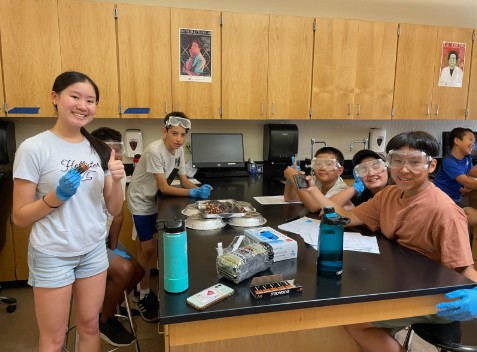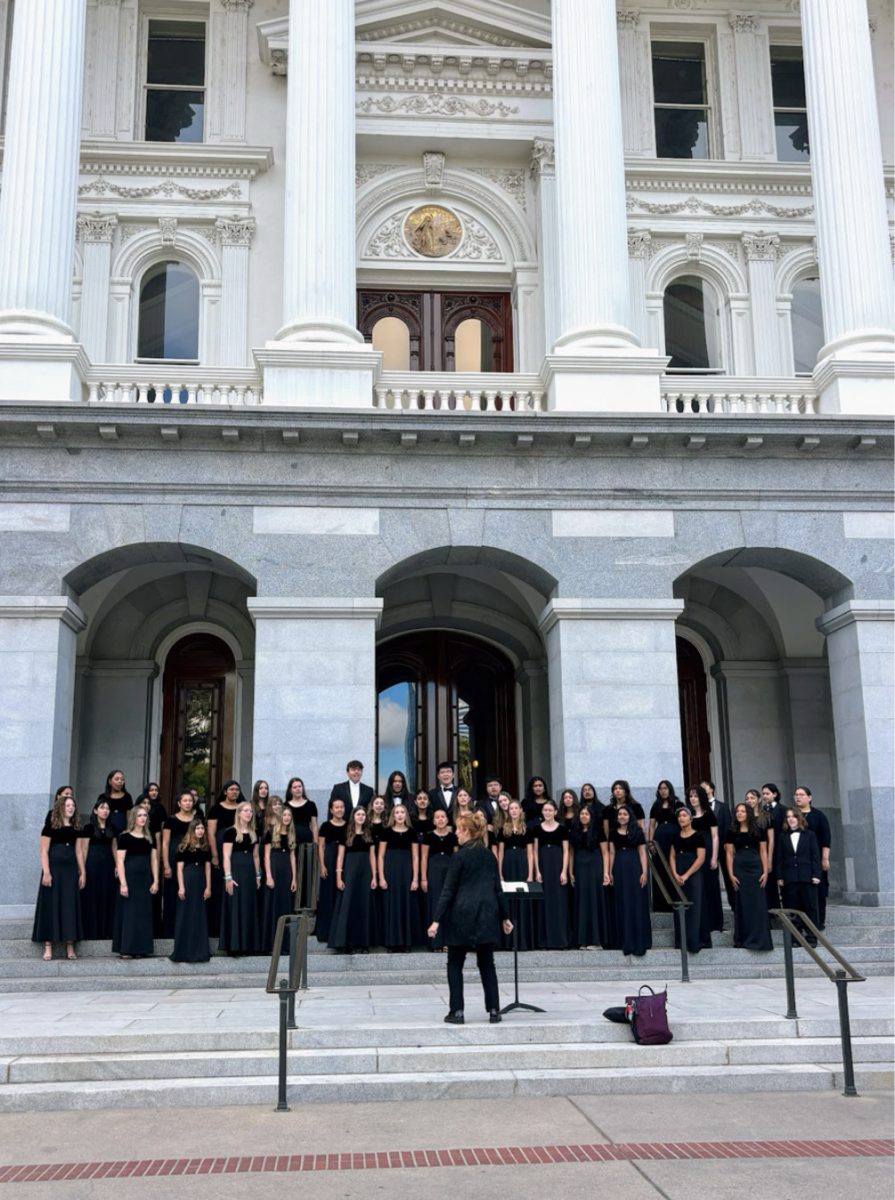Amid teacher shortages and lingering learning losses from the Covid-19 pandemic, students across the country are still struggling to catch up in core subjects like math and reading.
But in Sacramento, a group of high school students is stepping up to teaching the next generation STEM, through a completely student-run, nonprofit organization.
Creating a New Kind of Classroom Amid the Pandemic
Echelon Catapult began as a pandemic project between a handful of Jesuit and St. Francis High students. What started as a way to keep themselves and local middle schoolers engaged during the long months of lockdown has since grown into a thriving organization that now serves hundreds of students across Sacramento.
“All of our schools went online, and we were incredibly bored,” said Charles Sanders, a co-founder of Echelon Catapult who now studies biology at the University of Notre Dame. “We were trying to come up with a solution to this problem, where we could keep learning and growing, and all the younger kids who we knew in our lives could also keep learning and growing.”
His solution? A student-run organization that taught free STEM workshops over Zoom, so students throughout Sacramento could continue their education during the pandemic. The early classes covered topics not often found in classrooms, like cybersecurity, programming and plant biology, and were designed to be engaging and hands-on, even from a distance.
Sanders and his classmates built the project largely by themselves, writing their own lectures and creating their own slideshows. Unlike official clubs at Jesuit High, they didn’t receive help from an adult mentor, so they got creative.
“We had a bunch of kids drive by my house and pick up these little packages with experiments they could do at home,” Sanders said. “I thought this might just be some silly idea that wouldn’t actually work. But we put ourselves out there, and we had no idea that our classes would be in such high demand.”
From Zoom to In-Person: Building a Thriving Nonprofit
As Covid restrictions lifted, Echelon Catapult faced its next challenge – transitioning from an online program to in-person classes. Students had to navigate logistical challenges, like planning transportation, finding funding and obtaining classroom space.
“We had to find a way to reimagine our organization and turn it from something that was strictly online to something that was in person,” Sanders said. “We had to do a lot of outreach, but after that transition, I felt like we turned into a fully functioning nonprofit.”
By the summer of 2021, Echelon began hosting in-person classes and weeklong STEM camps at the Rancho Cordova Youth Center, allowing it to reach even more students – and to impact the students they wanted to help the most.
“We wanted to focus on underserved students from the very beginning,”
Sanders said. “We recognized that the students having the hardest time during the pandemic were the ones who attended schools that didn’t have much support.”
Now, Echelon Catapult members use the money they make as paid teachers at Jesuit and St. Francis to fund annual summer STEM workshops at RCYC, which are free and open to all students. And despite the graduations of all the original founders, Echelon Catapult continues to thrive today.
Elizabeth Koo, the current CEO of Echelon Catapult and a senior at St. Francis, joined the organization as a student eager to make a difference in her community. She first encountered the organization as a middle school student.
“My mom signed me up for a few Echelon Catapult Zoom lessons, and those taught me topics like chemistry – basically all the classes that I am teaching now,” Koo said.
After arriving at St. Francis and learning the organization still existed, she reached out to join. She started out as a teaching assistant the summer before her sophomore year and quickly became a lead teacher.
“That first experience officially leading a class gave me the skills to teach others,” Koo said. “We taught a class called STEM Explorations, which I like to call a buffet of STEM classes. Each day, the kids got a different sample – biology, chemistry, engineering, earth science.”
She remembers feeling unsure at first.
“I was nervous that maybe this wasn’t the right type of class that Echelon should be teaching,” she said. “But as the days went on, I realized that activities like elephant toothpaste or mini catapults – those are the things the kids would probably remember later on. That gave me the confidence to keep teaching.”
Bringing STEM to the Shelter: Echelon at St. John’s
As Echelon’s programs have expanded, so have its partnerships. One of its most impactful is with the St. John’s Program for Real Change, a local shelter that provides housing and resources for women and children experiencing homelessness.
St. Francis junior Ada Fruin, an Echelon member who coordinates the St. John’s partnership, was once an Echelon student herself. She joined the organization after remembering the excitement of taking Echelon’s anatomy and psychology classes in middle school.
“I just felt so – like it was just such an amazing thing to be able to learn something I was interested in outside of school,” Fruin said.
Fruin now organizes and leads monthly STEM workshops at St. John’s, creating themed science activities for children living at the shelter. These events are hands-on, playful and meant to create a positive association with learning.
“With St. John’s, it’s really about making sure the kids have fun while also being exposed to science,” Fruin said. “With other Echelon activities, it can be really curriculum-heavy. But at St. John’s, we want them to walk away feeling excited and curious.”
Each class starts with games like hangman or Pictionary before launching into themed activities – like building towers, extracting DNA from strawberries or learning about anatomy with clay organs.
“One of the most memorable moments was when a student came in and said, ‘I know you! You were here last time,’ ” Fruin said. “That meant so much, because it meant they were excited for whatever we were going to do that day. When they keep coming back, it means what we’re doing is actually creating a positive impact.”
Running these workshops hasn’t always been easy. Fruin often plans the events on short notice, recruits volunteers and has to adjust when activities don’t go as expected.
“One of the biggest challenges is that we’re trying new things every month,” she said. “Not everything works. Sometimes you talk up an activity and it fails. You have to show a video of what it should have done. But even then, it becomes a learning experience for us too.”
Empowering the Next Generation of STEM Leaders
At its core, Echelon Catapult is more than a STEM enrichment program. It’s a student-led community, built by teenagers for younger students, and driven by faith in access, leadership and hands-on education.
Koo said she believes the program stands apart because students are the ones running the show.
“We don’t have an adult moderator – all the curriculum we make is our own, we bring our own materials, we problem-solve when things go wrong,” she said. “Being the teacher, being the one responsible for what the students learn, teaches you so much maturity.”
Fruin agrees. Leading the St. John’s program was her first experience planning workshops independently, emailing partners, and running meetings.
“I think these are all skills that are really necessary for growing as a leader,” she said.
Koo says one of her proudest moments was when a former Echelon student came back to teach.
“She and her brother used to take our robotics camps, and now she’s on her school’s robotics team,” Koo said. “This summer, she came back to teach the class she once took. I think that’s what makes this work matter.”
And for young girls especially, Koo hopes Echelon shows them that STEM is for them, too.
“Even if a student doesn’t think it might be for her, just keep your eyes open to new opportunities,” she said. “Try it. Judge for yourself after you’ve had that experience.”










